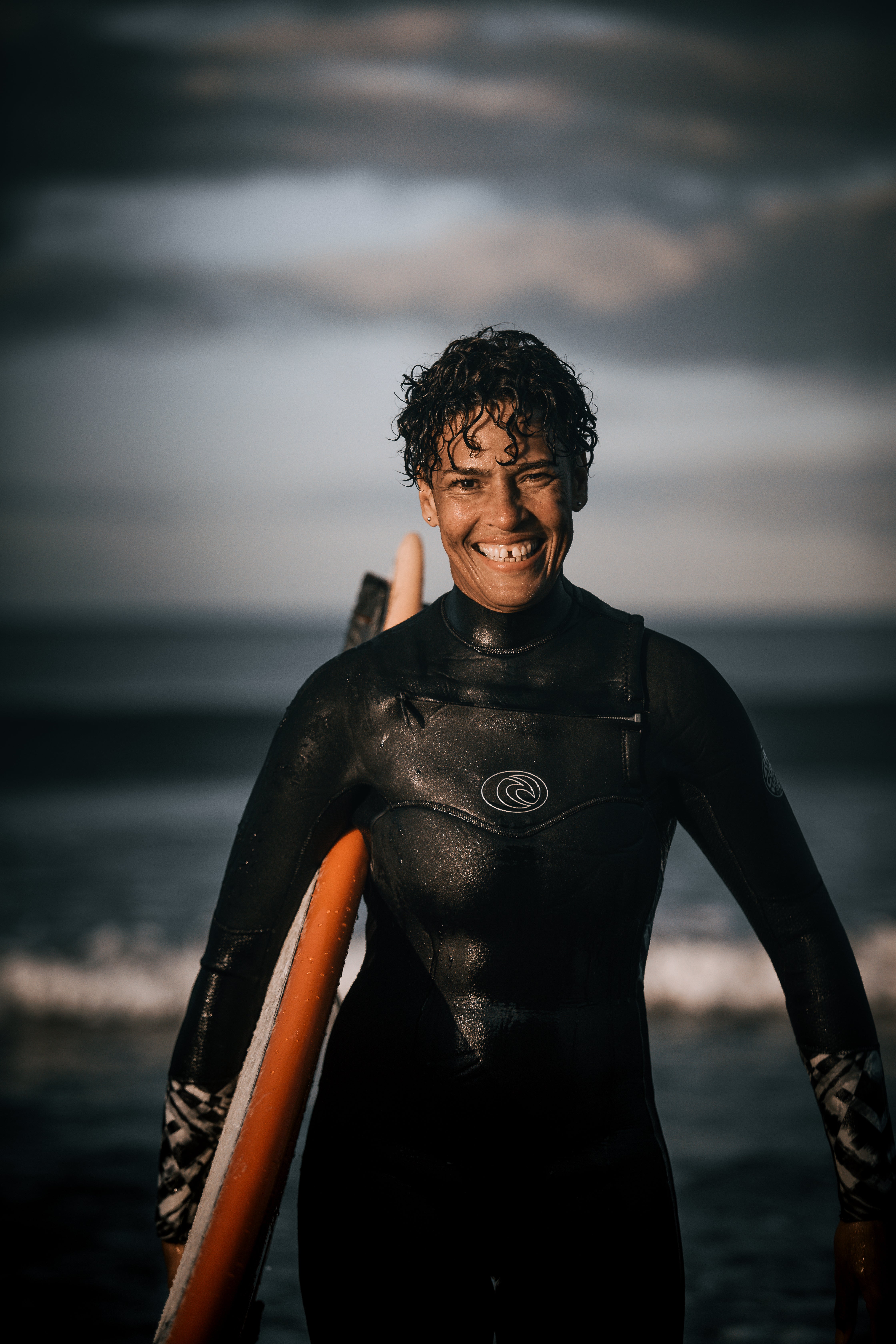Ex-England women’s captain on why she chose rugby over netball and how surviving cancer changed her
Paula George shares her remarkable journey from elite Welsh netballer to England rugby captain and beyond with Chloe Hubbard


Your support helps us to tell the story
From reproductive rights to climate change to Big Tech, The Independent is on the ground when the story is developing. Whether it's investigating the financials of Elon Musk's pro-Trump PAC or producing our latest documentary, 'The A Word', which shines a light on the American women fighting for reproductive rights, we know how important it is to parse out the facts from the messaging.
At such a critical moment in US history, we need reporters on the ground. Your donation allows us to keep sending journalists to speak to both sides of the story.
The Independent is trusted by Americans across the entire political spectrum. And unlike many other quality news outlets, we choose not to lock Americans out of our reporting and analysis with paywalls. We believe quality journalism should be available to everyone, paid for by those who can afford it.
Your support makes all the difference.Former England rugby captain Paula George exudes clean living: she is plant based, doesn’t drink and continues to prioritise training – albeit more mindful, breath-based exercise these days.
It is impossible to tell that this statuesque ex-fullback, who holds 77 England caps, has only just received the news that she is five years in remission from ovarian cancer.
The 54-year-old’s cancer journey and recovery is a remarkable story of resilience and typical of her modus operandi; she focuses, works hard and excels against the odds.
But like many female athletes of her generation, George’s story from elite Welsh netballer (she originally hails from Cynffig), capped Welsh rugby player, to England captain, to All Blacks’ official videographer and cancer survivor, is largely untold.

The reality of the untold tales of trailblazing female players was laid bare to George in 2021, when she heard the heartbreaking news that US women’s rugby player and coach, Kathy Flores, had died of colon cancer.
Flores was on the US team when it won the first women’s rugby World Cup against England in 1991. Later, she was the first woman, and first black woman, to coach a national rugby team, leading the US women’s team from 2003-2010.
George heard the news while in lockdown at her Auckland home with her wife Jo Caird. The couple watched the social networks light up with tales of Flores’ career. Caird became inspired to collect the stories of the architects of women’s rugby, many of whom felt their histories had been erased by poor record keeping or the politics of the game.
Hence Our Game Makers was born – a now published collection of extraordinary and previously unpublished stories of the women (and one man), who played an integral role in the history of the women’s game.
A bone of contention for many of the early pioneers was that the first two women’s rugby world cup competitions were deemed unofficial because World Rugby, then the International Rugby Board, was not involved. This left a bitter taste for the women who played in the 1991 and 1994 tournaments.

George explained: “The IRB came on board in 1998 and hosted the ‘official’ rugby world cup, and that meant the other two didn’t count. It was just really galling that what we had done didn’t matter… and it really mattered, this is what birthed it, this was the beginning of our game.”
When the women’s game was in its infancy, many of the women featured in the book faced serious adversity to even play the game.
“If you look at someone like Gill Burns, who everytime she walked into her club (Waterloo), walked under a sign that said ‘no dogs, no women’, but did it anyway.”
George added that on the other side of the world, former Black Fern Louisa Wall faced similar adversity, being banned from her club when it was discovered that she was a girl by Owen Delany - a prominent Kiwi sportsman in her district. Wall then turned to netball and represented New Zealand, returning to rugby only years later and eventually becoming a Black Fern.
Delany, later realising the importance of women’s sport, invited her to hang her Black Ferns jersey in the very clubhouse from which she was banned.

Wall, who features in the book, went on to be one of the lead politicians to push for same-sex marriage to become legal in New Zealand, eventually winning, making the country the first in the world to recognise gay marriage, George added: “She’s an incredible woman and she had been a Black Fern, so she was never going to be pushed around, she was always going to push boundaries.
“I look back on some of those women, and to know those stories didn’t ‘count’, or were going to be lost… and that really came to a head with me when Kathy (Flores) died.”
George grew up in South Wales and went to a 1,600 pupil comprehensive school where she was one of only two black children, an experience she described as an ‘”interesting way to grow up”. She explained that capturing Flores’s story was particularly important: “She was such a role model for me, she was such a beacon to me of colour, and I had very few black role models.
“I felt so grateful and lucky to be alive, but really sad that she couldn’t be. I think before (cancer) there were times when I would have been a ‘maybe’, but now I’m an ‘absolutely, yes’, and I’ll go for things I shouldn’t take on - like writing a book.”
Interestingly the book contains no photographs, but is instead illustrated by Hannah Wilkinson (a New Zealand international footballer with 113 caps), who depicts the subjects as though they were comic book superheroes. The link is intentional; the couple, who are both professional photographers, did not want grainy, dated images to take away from the impact of the stories. The reality is, there isn’t a proper record of women’s rugby from 30 years ago, let alone decent imagery to accompany it.
The issue is evidenced by the records kept on the number of England caps George achieved: “Bone of contention, the record books say 75, but I know it’s 77 because I kept a really good record of it. The records are really poor. I know I got 77, but I never counted tries, so I have no idea how many tries I scored.”
The modesty is typical of George, who explained how she ended up playing rugby in the first place, while moonlighting from elite netball.

She represented Wales in netball at both junior and senior level, only making the switch to rugby when she visited New Zealand in 1990, as part of an overseas netball programme. But while in the country George would sneak off to play in the local varsity league.
“I just loved it. I remember the first time I got the ball and I remember really clearly tucking it under my arm and instinctively fending someone off. I didn’t know if I was allowed to or not... I just fended them, and caught them right under the chin and they flew… and I went through and I scored. And I was like, ‘am I allowed to do that?’ And they were like, ‘yes, you can do that every day’.”
“I was constantly being told off in netball and I would always have to hold back that physicality in myself and to suddenly be able to fully express all of that and be rewarded for that, was just mind blowing and so freeing. Rugby was always this immense freedom and I loved the brutality of it.”
George ended up playing elite level netball and rugby simultaneously – playing for Wales in the 1991 netball world cup, and the 1991 rugby world cup. All long before any professional contracts were on offer or the internet recorded anything.
“And we didn’t care, we were under the radar and we were playing because we just loved playing, we played because it felt really bloody good to run with the ball. I didn’t care if I was in the newspaper or not. I played because I loved the feeling, it’s so freeing, it’s so not what you’re supposed to be as a woman.”
“You felt like you were a pioneer, you felt like you were doing something against what society wanted you to do, for me that was really important.”
Our Game Makers is available online at https://www.ourgamemakers.com/store
Join our commenting forum
Join thought-provoking conversations, follow other Independent readers and see their replies
Comments